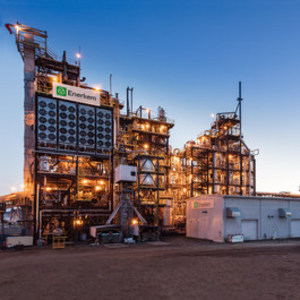Progress made on proposed Enerkem facility in Minnesota

PHOTO: Enerkem
December 18, 2018
BY Erin Krueger
The development of a waste-to-biofuels plant in Minnesota’s Twin Cities metro area is one step closer to reality with the Metropolitan Council’s recent approval of a memorandum of understanding (MOU) and design deposit agreement with Enerkem Inc.
On Dec. 12, the Metropolitan Council, a regional policy-making body and planning agency that serves the Minneapolis-Saint Paul metro area of Minnesota, announced it has approved a nonbinding MOU and design deposit agreement with the Canada-based biofuel producer, under which the council will provide reclaimed water to Enerkem’s proposed biofuels plant in Dakota County.
According to information released by the Metropolitan Council, the nonbinding MOU establishes how Enerkem will pay for the design, construction and operation of the council’s proposed Southeast Metro Water Reclamation Facility in Rosemount. The MOU also defines key terms for a future binding service agreement and states that the facility plan approved by the council in June 2018 will be the basis for preliminary design.
Advertisement
Advertisement
The proposed water reclamation facility would be located at the site of the council’s former Rosemount Wastewater Treatment Plant and would provide an estimated 1.6 million gallons of reclaimed water to Enerkem each day.
The binding design agreement obligates Enerkem to pay, via a $600,000 deposit, the cost of preliminary design for the proposed reclaimed water facility. The proposed water would be piped to the proposed Enerkem plant in Inver Grove Heights, according to the council.
Pierre Boisseau, senior director of communications and marketing at Enerkem, said he is not currently able to provide any information regarding the timing of a final decision on the development of the proposed biofuel plant. However, he said discussions are moving forward with local authorities, including the Metropolitan Council, and noted the company hopes to reach a final decision in the coming months.
Advertisement
Advertisement
Boisseau confirmed the proposed plant would leverage the same proprietary thermochemical conversion technology currently employed by the company’s biorefinery in Edmonton, Alberta. However, he said the Minnesota plant would be twice the size of the Edmonton plant and be capable of processing approximately three to four times the volume of waste as the Edmonton plant.
According to Boisseau, the proposed biofuels plant would take approximately 18-24 months to construct. If Enerkem elects to move forward with the project, operations could begin by the end of 2021.
Related Stories
The U.S. Energy Information Administration maintained its forecast for 2025 and 2026 biodiesel, renewable diesel and sustainable aviation fuel (SAF) production in its latest Short-Term Energy Outlook, released July 8.
XCF Global Inc. on July 10 shared its strategic plan to invest close to $1 billion in developing a network of SAF production facilities, expanding its U.S. footprint, and advancing its international growth strategy.
U.S. fuel ethanol capacity fell slightly in April, while biodiesel and renewable diesel capacity held steady, according to data released by the U.S. EIA on June 30. Feedstock consumption was down when compared to the previous month.
XCF Global Inc. on July 8 provided a production update on its flagship New Rise Reno facility, underscoring that the plant has successfully produced SAF, renewable diesel, and renewable naphtha during its initial ramp-up.
The USDA’s Risk Management Agency is implementing multiple changes to the Camelina pilot insurance program for the 2026 and succeeding crop years. The changes will expand coverage options and provide greater flexibility for producers.
Upcoming Events










